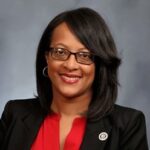Whitehall City Schools’ mascot is the Ram, which also serves as an acronym for one of Superintendent Sharee Wells‘ most important philosophies: Relationships always matter. It highlights the importance of strengthening bonds with students, staff, parents and the wider community in the Columbus, Ohio suburb.

The “RAM Way” was born in the district’s culture and climate committee, which explored how to make Whitehall a place where staff want to “come and stay,” says Wells, who became superintendent in 2022. Principals, for example, have created “calming spaces”—with massage chairs, calming music, crafts and other features—where teachers and staff can reset.
“When you’re working with young pole, it’s very draining—you’re giving giving giving,” Wells notes. “We’ve intentionally created spaces in schools for mental health and given people time and space to self-regulate.”
Students also have a place to go when they need to calm down. The district is staffing Health Labs that contain a variety of seating, exercise bikes and other equipment. Students can visit these safe spaces to work with an adult to lower their anxiety and develop a plan for returning to class without causing further disruptions. Like most other administrators, Wells has witnessed a decline in student behavior since the disruptions of the pandemic.
“Between the pandemic and access to technology, [students] are not as socially aware or adept,” she explains. “Executive functioning skills are not as strong as they would have been. They have to be taught how to engage, to manage conflict and to express their opinions.”
How K12 leadership has changed
Wells has been an administrator for 22 years, serving in leadership positions in Ohio’s Hilliard City School District and Columbus City Schools. One way the job has changed is there is now a much greater demand for collaboration and, she adds, superintendents would be wise to invite participation from in and outside the district.
“You’re not really leading and you’re opening yourself up to a lot of pushback if you’re trying to do things in isolation,” Wells points out. “The idea that as the leader you’re the one who makes all the decisions and everybody is going to follow blindly is completely out the door.”
‘Talking out of School’ podcast: Get a feel for Principal Kafele’s inspirational brand of PD
For one thing, online learning and the other experiences of the pandemic gave more people a window into the education system. “School leaders have to be intentional about how they engage people, communicate and build buy-in,” she adds. “People, more than ever before, want to be a part of processes and decision-making.”
The same can be said for students who, because they have immediate access to information, are no longer engaged by the traditional “sit-and-get” model of instruction. “They need to be taught to apply the information, what the information, means, how to analyze it and solve real-world problems,” she attests. “I am very passionate that—as our world changes, as kids change—we as an education system also have to evolve.”
Whitehall’s latest victories
Wells says she is “super-excited” about the district’s progress on its state report card, and she attributes the improvement to the hard work of teachers, principals and other staff members. The gains are also a result of higher expectations, and eliminating the “belief gap” that learners in high-poverty districts can’t compete with more affluent students.
Whitehall’s principals have been tasked with setting achievement goals around the district’s four big priorities, which it calls “commitments”—academics, behavior, attendance and family engagement. She and her team regularly visit schools to observe progress and find out what additional resources principals need.
“I believe in 50% accountability and 50% support,” she adds.
Like many districts, Whitehall has grappled with chronic absenteeism. The district is chipping away at the problem thanks to its “dynamic” director of family engagement who makes home visits and establishes direct connections with families to identify barriers to attendance, Wells explains.
“One of the things that has been most important in my journey is to show that whether you’re a small district, big district, school of poverty or school with resources, anything is possible,” She concludes. “But it happens with staff and community buy-in and a collective focus on the direction.”









